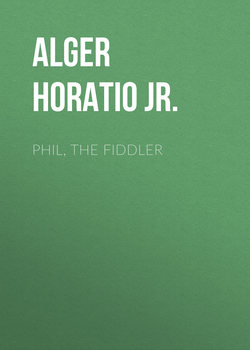Читать книгу Phil, the Fiddler - Alger Horatio Jr., Thomas Chandler Haliburton - Страница 8
CHAPTER VII
THE HOME OF THE BOYS
ОглавлениеIt was a quarter-past eleven when Phil and Giacomo entered the shabby brick house which they called home, for want of a better. From fifteen to twenty of their companions had already arrived, and the padrone was occupied in receiving their several contributions. The apartment was a mean one, miserably furnished, but seemed befitting the principal occupant, whose dark face was marked by an expression of greed, and alternately showed satisfaction or disappointment as the contents of the boys’ pockets were satisfactory or otherwise. Those who had done badly were set apart for punishment.
He looked up as the two boys entered.
“Well, Filippo,” he said, harshly, “how much have you got?”
Phil handed over his earnings. They were up to the required limit, but the padrone looked only half satisfied.
“Is that all you have?” he asked, suspiciously.
“It is all, signore.”
“You have not done well this afternoon, then. When I met you at twelve o’clock you had more than a dollar.”
“It was because a good signora gave me fifty cents.”
The padrone, still suspicious, plunging his hands into Phil’s pockets, but in vain. He could not find another penny.
“Take off your shoes and stockings,” he said, still unsatisfied.
Phil obediently removed his shoes and stockings, but no money was found concealed, as the padrone half suspected. Sometimes these poor boys, beset by a natural temptation, secrete a portion of their daily earnings. Whenever they are detected, woe betide them. The padrone makes an example of them, inflicting a cruel punishment, in order to deter other boys from imitating them.
Having discovered nothing, he took Phil’s violin, and proceeded to Giacomo.
“Now for you,” he said.
Giacomo handed over his money. The padrone was surprised in turn, but his surprise was of a different nature. He had expected to find him deficient, knowing that he was less enterprising than Phil. He was glad to get more money than he expected, but a little disappointed that he had no good excuse for beating him; for he had one of those hard, cruel natures that delight in inflicting pain and anguish upon others.
“Take care that you do as well to-morrow,” he said. “Go and get your supper.”
One of the larger boys was distributing bread and cheese to the hungry boys. Nearly all ate as if famished, plain and uninviting as was the supper, for they had been many hours without food. But Phil, who, as we know, had eaten a good supper at Mrs. Hoffman’s, felt very little appetite. He slyly gave his bread to one of the boys, who, on account of the small sum he brought home, had been sentenced to go without. But the sharp eyes of the padrone, which, despite his occupation, managed to see all that was going on, detected this action, and he became suspicious that Phil had bought supper out of his earnings.
“Why did you give your bread to Giuseppe?” he demanded.
“Because I was not hungry,” answered Phil.
“Why were you not hungry? Did you buy some supper?”
“No, signore.”
“Then you should be hungry.”
“A kind lady gave me some supper.”
“How did it happen?”
“I knew her son. His name is Paolo. He asked me to go home with him. Then he gave me a good supper.”
“How long were you there? You might have been playing and brought me some more money,” said the padrone, who, with characteristic meanness, grudged the young fiddler time to eat the meal that cost him nothing.
“It was not long, signore.”
“You can eat what is given you, but you must not waste too much time.”
A boy entered next, who showed by his hesitating manner that he did not anticipate a good reception. The padrone, accustomed to judge by appearances, instantly divined this.
“Well, Ludovico,” he said, sharply, “what do you bring me?”
“Pardon, padrone,” said Ludovico, producing a small sum of money.
“I could not help it.”
“Seventy-five cents,” repeated the padrone, indignantly. “You have been idle, you little wretch!”
